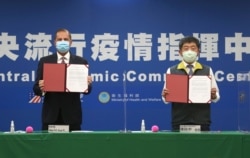The United States and Taiwan are making a public show of strengthening ties this week, signing a memorandum of understanding to improve cooperation in public health as part of a high-level U.S. visit to the island.
In the absence of formal diplomatic ties, the MOU was signed on Monday by W. Brent Christensen, director the American Institute in Taiwan, and Yang Jen-ni, chairwoman of the Taiwan Council for U.S. Affairs on behalf of the Taipei Economic and Cultural Representative Office in the United States.
Visiting U.S. Health and Human Services Secretary Alex Azar and Taiwanese Minister of Health and Welfare Chen Shih-chung witnessed the signing ceremony at the Central Epidemic Command Center in Taipei.
Three Taiwanese industry experts who spoke to VOA say the memorandum will bring business opportunities to Taiwan and a possible new driving force for the island’s economy already led by high tech industries, especially if the U.S. provides technology transfers in the manufacturing of advanced medical material. They said Taiwan is fully capable of helping the United States design medical supply chains, which can be closer to the U.S. soil and independent from its strategic rival China.
Shifting away from China
Darson Chiu, a research fellow at the Taiwan Institute of Economic Research, told VOA that, take the surgical face masks as an example, the coronavirus pandemic has prompted Taiwan’s policy makers to reassess the local economy’s heavy reliance on China.
He said that Taiwanese manufacturers, supervised by policy makers, have quickly multiplied domestic supply chains “with no China factors” since the COVID-19 pandemic, which plays a crucial role in the island’s success in stopping the virus’s spread. Previously, like the U.S., Taiwan relied heavily on China for imported face masks to meet its local demand.
“The Trump administration wants to reduce its reliance on China from its medical supply chain, and Taiwan has proved it’s feasible and manageable to do so,” he said. “The past model is Taiwan will use China as a supplier for materials and a manufacturing site to finish the end products before exporting them to the U.S. In the future, we may be moving to engage directly with the U.S. for the production of such strategic medical materials and align with the U.S. goal to get rid of this ‘middleman’.”
He added that if there’s strong demand from the U.S. for these public health products, some Taiwanese companies might consider shifting part of their supply chains to Mexico, “where they can enjoy low labor costs, zero tariff from USMCA [the United States, Mexico and Canada trade agreement], and lower transportation costs.”
Aaron Chen, the chief operating officer of TCI, said collaboration with Taiwan is consistent with America’s public healthcare policy needs and its goals to treat personal protective gears as its strategic national assets. TCI is a leading maker of private-label dietary supplements based in Taiwan.
“President (Donald) Trump wants to move the medical supply chain back to the U.S., but he has to consider costs,” said Chen. “For things like masks, which have low profit margins, it’s hard to shift the supply chain completely back to the U.S. For high value-added products, it also depends on if the U.S. government can roll out supporting policies for companies to shift their supply chain across the Pacific.”
A pool of talents
Chan Chang-chuan, former dean of National Taiwan University College of Public Health, told VOA that there’s another important playing card in Taiwan’s public health industry.
“Taiwan has great biotech R&D talents, and more than 70% of them are trained in the United States.,” said Chan.
He hopes the new memorandum of understanding will facilitate collaboration and investment in biotech firms between the U.S. and the island.
Taiwan Minister of Health and Welfare Chen Shih-chung called this week’s signing of the MOU a “historic moment,” adding that it marked a breakthrough in health and medical cooperation between Taiwan and the U.S.
Azar, the U.S. health chief, described the MOU as a "landmark achievement," as it formalized more than 20 years of collaboration between his department and Taiwan's Ministry of Health and Welfare on a wide range of issues.
Azar also praised Taiwan for its response to COVID-19, saying it has been “among the most successful in the world.”












